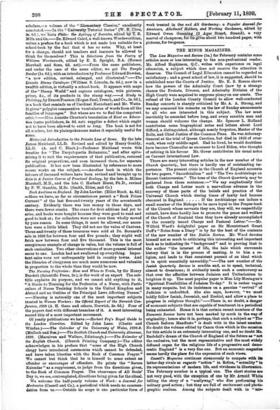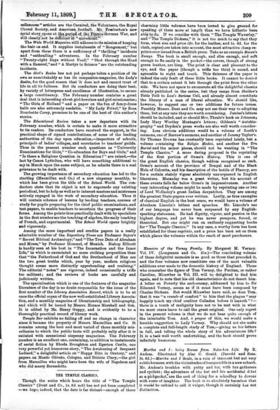THE MINOR MAGAZINES.
The Law Magazine and Review (5s.) for February contains some articles more or less interesting to the non-professional reader. Mr. Alfred Hopkinson, Q.C., writes with experience on legal education, a subject which does not receive the attention it deserves. The Council of Legal Education cannot be regarded as satisfactory ; and a great school of law, it is suggested, should be established near the Courts of Justice. Mr. E. S. Roscoe shows how the powers of the Admiralty Court (now by a strange chance the Probate, Divorce, and Admiralty Division of the High Court) were acquired to suppress piracy on our coasts. The refusal of the London County Council to allow well-conducted Sunday concerts is sharply criticised by Mr. A. A. Strong, and
we may commend his remarks on the law of Sunday amusements to all who are interested in this subject. The law must inevitably be amended before long, and every sensible man and woman should welcome the change. Mr. Spencer L. Holland contributes some biographical notes and letters about Lord Gifford, a distinguished, although nearly forgotten, Master of the Rolls, and Chief Justice of the Common Pleas. He was Attorney- General at the trial of Queen Caroline, but died in 1826 of over- work, when only middle-aged. Had he lived, he would doubtless have become Chancellor as successor to Lord Eldon, who thought of retiring in his favour. Mr. Gover contributes his usual notes on Current international Law.
There are many interesting articles in the new number of the
Church Quarterly, but there is hardly one of outstanding im- portance. The present crisis in the Church of England accounts for two papers, " Sacerdotalism " and " The Two Archbishops on Recent Controversies." The tone of the Church Quarterly may be gathered from these sentences :—" We say emphatically that both Charge and Letter mark a marvellous advance in the recovery of those parts of the beliefs and practice of the Universal Church which during times of laxity had become obscured in England If the Archbishops can induce a small number of the Bishops to he more loyal to the Prayer-book of the Church whose servants they are, they will, we respectfully submit, have done hardly less to promote the peace and welfare of the Church of England than they have already accomplished in the recently issued Charge and Pastoral Letter."—Mr. Wilfrid Ward's delightful paper on Sir Mountatuart Grant Duff's "Notes from a Diary" is by far the best of the contents of the new number of the Dublin Review. Mr. Ward devotes himself not so much to criticising this interesting and important book as to indicating its " background " and to proving that •to the author " the interest of life, the halo which surrounds history that is in the process of making, is to him a re- ligion, and leads to that consistent pursuit of an ideal which is in spirit essentially unworldly."—The new number of the Jewish Quarterly Review is erudite and, so to speak, technical, almost to dreariness; it evidently needs such a controversy as that over the affinities between Judaism and Unitarianism to brighten it up. The most popular paper is Miss Lily Montague's "Spiritual Possibilities of Judaism To-day." It is rather vague in many respects, but its insistence on a genuine "revival" of Judaism is undoubted. She also says, however, " we must boldly follow Isaiah, Jeremiah, and Ezekiel, and allow a place to progress in religious thought."—There is, no doubt, a danger of economic subjects that are capable of treatment in a periodical being exhausted. Hence it is that certain recent numbers of the Economic Review have not been marked by much in the way of originality; hence also it is, perhaps, that such a subject as "The Church Reform Manifesto " is dealt with in the latest number. No doubt the volume edited by Canon Gore which is the occasion for this article is an extremely interesting one, and no doubt Mr. Rashdall's dream of the Church of England of the future as "not the exclusive, but the most representative and the most widely diffused organ for the religious life of a progressive and demo- cratic England" is a very fine one. But an economic magazine seems hardly the place for the expression of such views.
Cassell's Magazine continues strenuously to compete with its latter-day rivals as regards "action " in fiction, " actuality" in its representations of modern life, and vividness in illustration. The February number is a typical one. The short stories are not very good, with the exception of one by Mr. Arnold White telling the story of a "scallywag," who dies performing his solitary good action ; but they are full of excitement and photo- graphic realism. Among the subjects dealt with in "mils oellaneous " articles are the Carnival, the Volunteers,- the Royal Choral Society, and American, football. hi r. Pemberton's new serial story opens at ,tlie.perid, FFaneaGerman War, and will be delcientil "neveneii?
The Wide World Magazine still adheres to its mission of keeping the hair on end. It supplies instalments of " Rougemont," but apart from these there -is a sufficiency of " thrilling " incidents and -" enthralling " adventures. In the February number "Twenty-eight Days without Food," " Shot through the Head with a Ramrod," and " A Martyr to Science " are the outstanding incidents.
The Girl's Realm has not yet perhaps taken a position of its own as unmistakably as has its companion-magazine, the Lady's Realm, for the good reason that it does not and cannot treat of life in all its fullness. But its conductors are doing their best, by variety of letterpress and excellence of illustration, to secure a large constituency. The February number contains a great deal that is interesting about girl-heroines and girl-missionaries ; " The Girls of Holland " and a paper on the fun of fancy-dress balls are also extremely readable. " My Lady Frivol," by Rosa Nouchette Carey, promises to be one of the best of this author's stories.
The Educational Review takes a new departure with its February number, which is certain to make it more attractive to its readers. Its conductors have received the support, in the practical shape of signed contributions, of some of the leading authorities of the day upon education,—inspectors of schools, principals of ladies' colleges, and secretaries to teachers' guilds. Thus in the present number such questions as " University Examinations for Girls," " Co-education for Boys and Girls," and "Is there a Religions Question in Education ?" are raised,—the last by Canon Lyttelton, who will have something additional to say in March upon the same subject, as he admits there is a real grievance to be dealt with.
The growing importance of secondary education has led to the starting (Macmillan and Co.) of a new sixpenny monthly, to which has been given the title of the School- World. The con- ductors state that its object is not to supersede any existing periodical, but to help as well as to interest masters and mistresses actively engaged in the work of secondary education. Thus it will contain schemes of lessons by leading teachers, courses of study for pupils preparing for the chief public examinations, and test papers, to enable teachers to ascertain the progress of their forms. Among the points thus practically dealt with by specialists in the first number are the teaching of algebra, the early teaching of French, and experimental. The School World opens brightly and vigorously.
Among the more important and erudite papers in a really admirable number of the Expository Times are Professor Sayce's " Recent Biblical A.rchesology," and "The True Date of Abraham and Moses," by Professor Hommel, of Munich. Bishop Ellicott is hardly seen at his best in "The Incarnation and the Inner Life," in which is enunciated no more striking proposition than that "the Fatherhood of God and the Brotherhood of Man are the two great truths which, year by year, modern religious thought seems more distinctly apprehending and realising." The editorial "notes" are vigorous, indeed occasionally a trifle too militant ; and the reviews of books are carefully and judiciously written.
The specialisation which is one of the features of the magazine literature of the day is no doubt responsible for the issue of the first number of the Library Association Record, which is to be at once the official organ of the now well-established Library Associa; tion, and a monthly magazine of librarianship and bibliography, and which will be issued by Messrs. Horace Marshall and Son. It is edited by Mr. Henry Guppy, and is evidently to be a thoroughly practical record of library work.
Temple Bar exhibits no falling off and no change in character since it became the property of Messrs. Macmillan and Co. It remains among the best and most varied of those monthly mis- cellanies to which the public taste will probably rally after it is satiated with sensational sixpenny magazines. The February number is an excellent one, containing, in addition to instalments of serial fiction by Rhoda Broughton and Egerton Castle, one very powerful yet humorous story, "The Awakening of Sergeant Lediard," a delightful article on " Happy Hits in Oratory," and papers-on Monte Oliveto, Cologne, and Desiree Clary,—the girl from Marseilles who might have been the wife of Napoleon and who did marry Bernadotte.







































 Previous page
Previous page